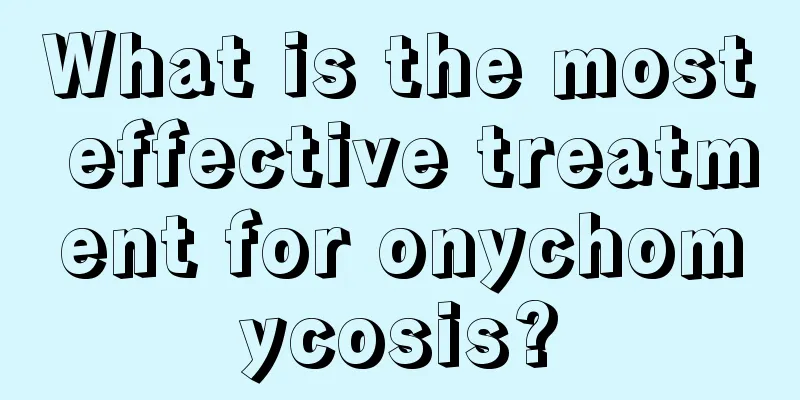What is the most effective treatment for onychomycosis?

|
As the saying goes, if you have onychomycosis, one person can infect two, so patients must seek timely treatment. There are many treatment methods, which can be treated with some oral and topical medications. For patients with recurrent symptoms, certain folk remedies can be used, such as using vinegar for bactericidal treatment, which is also very effective. Of course, for more serious patients, surgical nail removal can also be used for treatment. 1. Surgical nail removal Suitable for single nails. Under local anesthesia, the affected nail is removed. This method causes large wounds, bleeding, and is prone to infection. The operation generally causes more pain and is prone to recurrence of infection, so it is rarely used in clinical practice. Patients with heart disease, high blood pressure, diabetes, etc. are not suitable for surgical treatment. 2. Oral medication Suitable for multiple nails. For example, take 250 mg of terbinafine tablets orally daily for 6 to 12 weeks; take itraconazole 400 mg/day for 7 days and rest for 21 days as a course of treatment, and continue for 3 to 6 courses; take fluconazole 150 mg 1 to 2 times a week for more than 4 months. It can cure more than 80% of onychomycosis and onychomycosis. However, because this type of drug must reach the deck where the fungus is parasitic to exert its antibacterial effect, the dosage is large and the medication time is long, adverse drug reactions should be monitored regularly. 3. Topical therapy Depending on the different drugs, the main methods include local application of drugs and sealing and cutting. (1) Use a nail file (non-professionals should not use a razor blade to avoid bleeding and infection) to thin out irregular nails. The best time to do this is once every two days. (2) Apply 30% glacial acetic acid or 10% glacial acetic acid to the affected nails once a day for more than 3 to 6 months. The effect will be better if the diseased nail is thinned before applying the medicine. Before applying nail polish, be sure to protect the skin around the nails with a mild ointment; (3) Antifungal topical medications such as terbinafine tincture, amorolfine nail liniment, and ciclopirox nail liniment should be applied topically. 4. Treatment remedies 1. Vinegar. While there's no conclusive evidence that soaking your nails in vinegar can cure onychomycosis, studies have shown that it can inhibit certain bacteria. Some people recommend soaking your nails in a mixture of 1 part vinegar and 2 parts water for 15 to 20 minutes. Just remember to rinse thoroughly and pat dry, and you're done. 2. Add some apple cider vinegar to warm water and mix it well. Soak your nails in the water for about 15-20 minutes and then dry them completely. |
<<: Do you know the three major triggering factors of allergic eczema?
>>: What are the typical symptoms of viral encephalitis in children?
Recommend
What are the early symptoms of nasopharyngeal carcinoma and how to treat it
What are the early symptoms of nasopharyngeal car...
Does advanced lung cancer with bone metastasis still require chemotherapy?
After bone metastasis, whether chemotherapy is us...
Can it be lung cancer without cough? There is a certain possibility
Coughing is an early symptom of lung cancer. Lung...
Gastroenteritis Cefprozil Dispersible Tablets
Gastroenteritis is a stomach disease, which is us...
What causes hard bumps under the skin of the neck?
In daily life, skin pimples are a common problem....
Is it serious if small cell lung cancer metastasizes to the liver? Very serious
There are many patients suffering from small cell...
Why does my knee joint itch?
Many people may have experienced itching inside t...
How many macadamia nuts should a pregnant woman eat a day?
Macadamia nuts are a very nutritious fruit and an...
How much does a gastric cancer tumor marker test cost
The cost of gastric cancer tumor marker testing i...
How to use a thermometer?
Thermometers are common tools in our lives. Many ...
What to do if there are small fleshy bumps on the back of the tongue
If there is a problem with your tongue, it is eas...
What are the symptoms of frozen shoulder?
Periarthritis of the shoulder is a common disease...
What are the effective prevention methods for lung cancer? The most effective prevention methods for lung cancer
As we all know, lung cancer has the highest morta...
What should we pay attention to in prostate cancer care
What should be paid attention to in prostate canc...
The best hospital for testicular cancer in the country
We want the best of everything in life, including...









